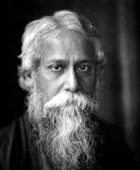Greatest writer in modern Indian literature, Bengali poet, novelist, educator, who won the Nobel Prize for Literature in 1913. Tagore was awarded the knighthood in 1915, but he surrendered it in 1919 as a protest against the Massacre of Amritsar, where British troops killed some 400 Indian demonstrators protesting colonial laws. Tagore's reputation in the West as a mystic has perhaps mislead his Western readers to ignore his role as a reformer and critic of colonialism.
"When one knows thee, then alien there is none, then no door is shut. Oh, grant me my prayer that I may never lose touch of the one in the play of the many." (from Gitanjali)
Rabindranath Tagore was born in Calcutta in a wealthy and prominent Brahman family. His father was Maharishi Debendranath Tagore, a religious reformer and scholar. His mother Sarada Devi, died when he was very young - her body carried through a gate to a place where it was burned and it was the moment when he realized that she will never come back. Tagore's grandfather had established a huge financial empire for himself, and financed public projects, such as Calcutta Medical College. The Tagores were pioneers of Bengal Renaissance and tried to combine traditional Indian culture with and Western ideas. However, in My Reminiscenes Tagore mentions that it was not until the age of ten when he started to use socks and shoes. Servants beat the children regularly. All the children contributed significantly to Bengali literature and culture. Tagore, the youngest, started to compose poems at the age of eight. He received his early education first from tutors and then at a variety of schools. Among them were Bengal Academy where he studied Bengali history and culture, and University College, London, where he studied law but left after a year without completing his studies. Tagore did not like the weather. Once he gave a beggar a gold coin - it was more than the beggar had expected and he returned it. In England Tagore started to compose the poem Bhagna Hridaj (a broken heart).
In 1883 Tagore married Mrinalini Devi Raichaudhuri, with whom he had two sons and three daughters. He moved to East Bengal in 1890. His first book, a collection of poems, appeared when he was 17; it was published by Tagore's friend who wanted to surprise him. In East Bengal (now Bangladesh) he collected local legends and folklore and wrote seven volumes of poetry between 1893 and 1900, including Sonar Tari (The Golden Boat), 1894 and Khanika, 1900. This was highly productive period in Tagore's life, and earned him the rather misleading epitaph 'The Bengali Shelley.' More important was that Tagore wrote in the common language of the people and abandoned the ancient for of the Indian language. This also was something that was hard to accept among his critics and scholars.
In 1901 Tagore founded a school outside Calcutta, Visva-Bharati, which was dedicated to emerging Western and Indian philosophy and education. It became a University in 1921. He produced poems, novels, stories, a history of India, textbooks, and treatises on pedagogy. His wife died in 1902, followed in 1903 by the death of one of his daughters and in 1907 his younger son.
Tagore's reputation as a writer was established in the United States and in England after the publication of Gitanjali: Song Offerings, in which Tagore tried to find inner calm and explored the themes of divine and human love. The poems were translated into English by Tagore himself. His cosmic visions owed much to the lyric tradition of Vaishnava Hinduism and its concepts about the relationship between man and God. The poems appeared in 1912 with an introduction by William Butler Yates, who wrote "These lyrics - which are in the original, my Indians tell me, full of subtlety of rhythm, of untranslatable delicacies of colour, of metrical invention - display in their thought a world I have dreamed of all my life long." His poems were praised by Ezra Pound, and drew the attention of the Nobel Prize committee. "There is in him the stillness of nature. The poems do not seem to have been produced by storm or by ignition, but seem to show the normal habit of his mind. He is at one with nature, and finds no contradictions. And this is in sharp contrast with the Western mode, where man must be shown attempting to master nature if we are to have "great drama." (Ezra Pound in Fortnightly Review, 1 March 1913) However, Tagore also experimented with poetic forms and these works have lost much in translations into other languages. Especially Tagore's short stories influenced deeply Indian Literature, and he was the first Indian to bring an element of psychological realism to his novels. Tagore wrote his most important works in Bengali, but he translated his poems into English, forming new collections. Many of his poems are actually songs, and inseparable from their music. His written production, still not completely collected, fill 26 substantial volumes. At the age of 70 Tagore took up painting. He was also a composer, settings hundreds of poems to music. Tagore's song Sonar Bangla Our Golden Bengal became the national anthem of Bangladesh. He was an early advocate of Independence for India and his influence over Gandhi and the founders of modern India was enormous. |






